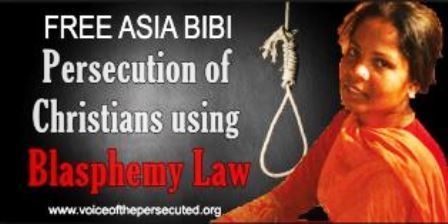
Also on the Pakistani Blasphemy Laws
By Sheraz Khan, South Asia Correspondent for ASSIST News Service
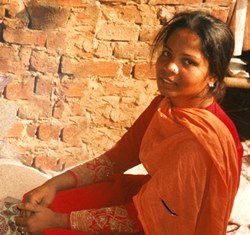 LONDON/GLASGOW, UNITED KINGDOM/LAHORE,/KARACHI, PAKISTAN (ANS — January 6, 2018) — Condemning the continued incarceration of Asia Bibi, a blasphemy-accused Pakistani Christian woman, for the 8th consecutive year, international Christian rights organisations, human rights charities, and Pakistani Christian rights activists, have called for the release of the former Christian farm worker.
LONDON/GLASGOW, UNITED KINGDOM/LAHORE,/KARACHI, PAKISTAN (ANS — January 6, 2018) — Condemning the continued incarceration of Asia Bibi, a blasphemy-accused Pakistani Christian woman, for the 8th consecutive year, international Christian rights organisations, human rights charities, and Pakistani Christian rights activists, have called for the release of the former Christian farm worker.
It was on June 14, 2009, when Bibi’s life was turned upside down after she “dared” to drink water from a glass that was owned by her Muslim women colleagues at the farm where she worked. A verbal altercation ensued between Bibi and her Muslim co-farmworkers, and she was subsequently accused of having committed blasphemy.
Bibi has consistently denied having committed alleged blasphemy against Muhammad, the prophet of Islam.
No sooner as it was claimed that Bibi had committed blasphemy, an angry mob gathered at the scene. Amidst the highly anti-Bibi, and anti-Christian climate of this Muslim clerics-led religious frenzy, which follows on a routine basis in Pakistan, in the wake of any blasphemy-related accusations, Bibi was said to have been subjected to physical abuse by the mob.
In 2009, a police First Information Report (FIR), was registered against Asia Bibi by a religious cleric, Qari Muhammad Salaam, even though that ANS understands that Salaam was not a witness to the alleged blasphemy.
Two Pakistani Muslim farmworkers, who were sisters and used to work alongside Bibi, then apparently relayed the alleged blasphemy to Salaam, who then reportedly went to the local police station in district Sheikhupura, 22 miles North-West of the Pakistani eastern city of Lahore, in the Pakistani province of Punjab of Pakistan, and was claimed to have pressured the police into registering a blasphemy case against Bibi on the premise of a second-hand, and unsubstantiated account, of the alleged blasphemy attributed to Bibi.
The controversial FIR formed the basis of Bibi’s monumental suffering, which, tragically continues to this day. Bibi, subsequently, faced trial, was convicted, and was handed a death sentence by a Pakistani trial court, in 2010. Bibi became the first Pakistani woman to be sentenced to death under Pakistan’s disputed blasphemy laws.
The Lahore High Court, subsequently, upheld the death sentence. Pakistan’s top court, the Supreme Court of Pakistan, admitted Bibi’s appeal in July 2015. In October 2016, the Supreme Court fixed a date for hearing Bibi’s case, however, the court adjourned the hearing after one of the three judges, who were to hear Bibi’s appeal, refused to hear the case. A new date for the hearing has yet to be set.
Alongside Christian rights groups, human rights organizations, minority rights think-tanks and many other organizations, who do lobbying and advocacy on behalf of minorities, Pope Francis, and the European Parliament, have, in the past, called for the release of Ms. Bibi.
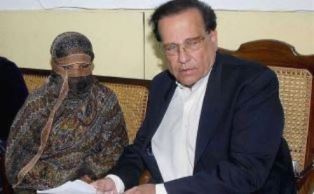 In 2011, the Bibi case acquired international attention when Pakistan’s the then moderate, enlightened and pro-minorities’ governor of Punjab, Salman Taseer, was assassinated, after he had met Bibi in the prison, and disclosed his intention to the media men present there that he would put forward his proposal of a presidential pardon for Bibi to the then Pakistani President, Asif Ali Zardari.
In 2011, the Bibi case acquired international attention when Pakistan’s the then moderate, enlightened and pro-minorities’ governor of Punjab, Salman Taseer, was assassinated, after he had met Bibi in the prison, and disclosed his intention to the media men present there that he would put forward his proposal of a presidential pardon for Bibi to the then Pakistani President, Asif Ali Zardari.
The governor, who was widely criticized in Pakistan, for having suggested presidential clemency for Bibi, was killed in Islamabad, the capital of Pakistan, by one of his own security detail, Mumtaz Qadri.
Another high-profile assassination linked to Bibi in the same year (2011) was that of the then leading Pakistani Christian minority rights activist, Shahbaz Bhatti, who was then the Federal Minister for Minorities. Bhatti, at the time, was the only Christian cabinet member, and had backed Taseer’s proposal of a presidential amnesty for Bibi.
Offences pertaining to religion in Pakistan were introduced in the colonial era in British India which included the territory that is now Pakistan, under the premise of reining-in religious violence between Hindus and Muslims.
General Zia-ul-Haq, the late military dictator of Pakistan (1977-1988), introduced additional laws from 1980 to 1986. These laws continue to be abused, since their introduction, and have attracted criticism from human rights organisations in Pakistan, and around the world.
The death sentence by hanging to Bibi has attracted condemnation from Christian rights groups, and human rights campaigners in Pakistan, and around the world, and the rights groups have since been calling for the release of Bibi.
 Speaking to ANS, John Mason, a member of the Scottish Parliament (MSP) from Glasgow Shettleston, stated, that in an ideal world, the blasphemy laws have no place in Pakistan, or elsewhere in the world, stating that Britain used to have blasphemy laws but they have since been abolished. He said people in the past have insulted Jesus Christ, and they should be allowed to do so, adding, “… from that perspective, people should be allowed to insult any sincerely-held faith.” He went on to say: “I understand that when people insult other people’s religions, it can be hurtful for the believers of that religion. For me, it is a matter of freedom of religion, thought, conscience and belief.”
Speaking to ANS, John Mason, a member of the Scottish Parliament (MSP) from Glasgow Shettleston, stated, that in an ideal world, the blasphemy laws have no place in Pakistan, or elsewhere in the world, stating that Britain used to have blasphemy laws but they have since been abolished. He said people in the past have insulted Jesus Christ, and they should be allowed to do so, adding, “… from that perspective, people should be allowed to insult any sincerely-held faith.” He went on to say: “I understand that when people insult other people’s religions, it can be hurtful for the believers of that religion. For me, it is a matter of freedom of religion, thought, conscience and belief.”
Mason also said that every person in the world should be allowed to express their views whether, or not, they have a religion.
He stated that Christians in this country [Britain] sometimes come under pressure because of their Christian faith, however, he said, that the situation is not comparable to what it is like in Pakistan, or some other countries, such as, Saudi Arabia.
“It’s the individual laws of a certain country that matter most to the people of that country. The Rohingya of Myanmar [formerly Burma] are being persecuted by Buddhists there,” said John Mason. “
Whilst acknowledging the pressures on lawyers to take on blasphemy cases in Pakistan, he stated, that the Muslim lawyers, in the past, have defended Christian and Muslim blasphemy-accused, and said, “That is how it should be if the legal system in a country is working properly.
Asked, how, he as an MSP, raised the case of Asia Bibi in the past, Mason stated that he had tabled a motion in the Scottish Parliament in October 2014. “We have a cross-party parliamentary group in the Scottish parliament, which advocates religious freedom and belief,” he told ANS, adding that the parliamentary group, and many other organizations, “would like to keep Bibi’s case on the public agenda. I am planning to table another motion, which, will call for the release of Bibi, in the Scottish parliament.”
When ANS asked Mason, what was the Scottish government doing, to alleviate poverty and ignorance in Pakistan, he stated, that the Scottish Government is very keen on promoting education in Pakistan, and he also maintained that Pakistan is one of the four countries, alongside three African countries, which the Scottish Government is keen to fund, in the near future, for promoting education.
Scotland, he stated, has traditional links with these countries. Mason went on to say that many Pakistanis live in Scotland and he felt that there is a lot that Scotland can learn from Pakistan, and also there is much that Pakistan can learn from Scotland, especially in promoting tolerance in Pakistan.”
Asked what message he would like to give to the persecuted church in Pakistan, and around the world, Mason stated that he views Christians around the world as one Body of Christ.
“Wherever Christians are struggling because of their faith, whether in Pakistan, or elsewhere in the world, I would like to say to them that they are not forgotten. They are our brothers and sisters, and are not foreign to us, as all Christians are the body of Christ,” said Mason.
He said that the churches in Scotland are praying for Asia Bibi. Some churches, he stated, are more informed than others on the issue of Ms. Bibi. “More and more churches are learning about Bibi, and are praying for her release,” he added.
When ANS asked Mason what message he would like to give to the international community, he stated, that they [the international community] should keep up the pressure on Pakistan for the release of Bibi.
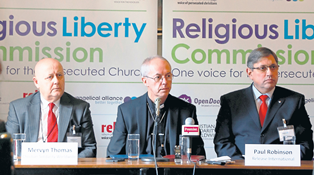 Commenting on the lack of will on the part of the Pakistani authorities to repeal Pakistan’s blasphemy laws, Paul Robinson, Chief Executive of the Release International (www.releaseinternational.org), a UK based charity, which works in more than 30 countries stated: “We call on the government of Pakistan to abolish the blasphemy laws and seek to create a society where every Pakistani citizen is free to exercise their faith and live in peace with their neighbours. The worry is that the climate in Pakistan is taking a turn for the worse for Christians.”
Commenting on the lack of will on the part of the Pakistani authorities to repeal Pakistan’s blasphemy laws, Paul Robinson, Chief Executive of the Release International (www.releaseinternational.org), a UK based charity, which works in more than 30 countries stated: “We call on the government of Pakistan to abolish the blasphemy laws and seek to create a society where every Pakistani citizen is free to exercise their faith and live in peace with their neighbours. The worry is that the climate in Pakistan is taking a turn for the worse for Christians.”
In a written statement sent to ANS, Release International, stated: “Less than one week after the 2016 Easter Sunday bombing which claimed over 70 lives, mostly Christians, in the eastern Pakistani city of Lahore, the government of Pakistan [has] again showed itself to be weak in the face of protests by Islamists angry at the execution of political assassin, Mumtaz Qadri.
“Initial promises to crack down on extremists now seem a long way off as the government gave in to seven of the ten demands made by protesters in Islamabad, including a promise not to make any amendments to the extremely controversial, and widely misused blasphemy laws.”
It added: “Of great concern is the government’s accession to one of the demands to ‘show no leniency’ to anyone convicted of blasphemy.
“This, alongside the protesters calling for her execution, puts Asia Bibi, a Christian woman who has been on death row for blasphemy since 2010, in a very grave position.
“As well as demanding no amendments to the blasphemy law and no leniency for those convicted under it, they have been specifically demanding Asia Bibi’s execution,” said the statement.
The Release International statement went on to say that the voices of those who oppose the blasphemy laws are silenced through violence. Punjab Governor Salman Taseer and Minorities Minister Shahbaz Bhatti were both assassinated after speaking out against the blasphemy laws, and in support of Asia Bibi.
It added: “Release International first ran a campaign for the repeal of the blasphemy laws in Pakistan in 2011. Today, we are renewing our call to the government of Pakistan, and to the Prime Minister of Pakistan, Shahid Khaqan Abbasi, to act with courage and humanity and abolish these iniquitous laws for the good of all Pakistanis.”
Highlighting the serious detriment, the blasphemy laws, have posed to the lives of the past victims of the Pakistan’s blasphemy laws, the Release International’s statement, quoted the Centre for Research and Security Studies, as saying in its report, “Blasphemy Laws in Pakistan — An Historical Overview,” that since 1990, as well as those convicted through the courts, “52 people have been extra-judicially murdered, for being implicated in blasphemy charges.”
The Release International’s statement stated that it [Release International] has urged its supporters around the world to sign an online petition that called for the release of Bibi. The petition, the statement said, was presented to the Pakistani High Commission in London.
Addressing the Prime Minister of Pakistan, Shahid Khaqan Abbassi, in its statement, Release International, urged the Pakistani government to repeal Pakistan’s blasphemy laws.
The Release International’s statement also stated: “We strongly urge the government of Pakistan to repeal the nation’s blasphemy laws, most notably, section 295-C which carries a mandatory death sentence.
“These laws, which are frequently misused, foster religious intolerance, and are incompatible with Pakistan’s aspiration of being a modern, democratic, Islamic state respected by the international community.”
It added: “We would encourage you, when considering this, to listen afresh to the words of Muhammad Ali Jinnah, the founder, and first governor general of Pakistan, who, in his first address to the first constituent assembly of Pakistan on the 11th of August, 1947, stated: ‘You are free; you are free to go to your temples, you are free to go to your mosques or to any other place of worship in this State of Pakistan. You may belong to any religion or caste or creed – that has nothing to do with the business of the State.’”
The Release International statement claimed to have run two campaigns, in 2011 and 2016, which, the statement said, focused on highlighting the misuse of Pakistan’s blasphemy laws.
The statement said: “The campaigns featured and highlighted Asia Bibi’s case significantly. We encourage our supporters to write both letters of encouragement, and letters on behalf of prisoners.”
A UK-based Open Doors (www.opendoorsuk.org) spokesperson said: “Our supporters are praying that Asia Bibi will be released and that she will be reunited with her family after so many years.”
A spokesperson for Voice of Martyrs USA (www.persecution.com) has urged people around the world to sign their petition for the release of Asia Bibi. It can be accessed by visiting (www.CallForMercy.com) and according to their spokesperson, has collected more than 700,000 signatures calling for the immediate release of Ms. Bibi.
The VOM USA spokesperson stated that they have, three times in the past, handed petitions calling for the release of Bibi to the Pakistani embassy in Washington DC, and he stated, “We have also encouraged people to write letters to Asia Bibi (and to the Pakistani government) via (www.PrisonerAlert.com), which features an Asia Bibi’s page and more than 27,000 letters have so far been composed for her via the site.
“We, here at Voice of the Martyrs USA, join with Christians around the world in praying for Asia Bibi and her family, and we continue to call for her immediate and unconditional release, and invite others to join in that call.”
A spokesperson for Amnesty International UK (www.amnesty.org.uk) has stated that she regretted that Ms. Bibi was still in prison, stating that they [Amnesty International] were monitoring her case. The spokesperson also said that they regularly highlight Bibi’s case through press releases and reports. The spokesperson stated that the Amnesty International recently published a report in December 2016 on Pakistan’s blasphemy laws titled, “As Good as Dead: The Impact of the Blasphemy Laws in Pakistan.”
 Another group, Global Minorities Alliance or GMA (www.globalminorities.co.uk), a Scotland-based human rights organization, has also condemned, Asia Bibi’s continued imprisonment. Shahid Khan, a trustee of the GMA, stated: “We call upon the Pakistani authorities to release Asia Bibi immediately and unconditionally.
Another group, Global Minorities Alliance or GMA (www.globalminorities.co.uk), a Scotland-based human rights organization, has also condemned, Asia Bibi’s continued imprisonment. Shahid Khan, a trustee of the GMA, stated: “We call upon the Pakistani authorities to release Asia Bibi immediately and unconditionally.
“The misuse of the Pakistan’s blasphemy laws is a matter of serious concern. The Pakistani authorities should put in place measures so that people there [Pakistan] no longer misuse the laws for their vested interests.”
Just before this Christmas, our ASSIST News Service (www.assistnews.net), sent out to our subscribers, six questions in relation to Asia Bibi for this feature article. Responding to the ANS questions, Adrian Hawkes, a regular ANS contributor who, lives with his wife, Pauline, in London, UK, stated, that he first got to know about the plight of Asia Bibi through ANS. “It is a tragedy, and I think, the more noise we make about this terrible injustice the better”, he said.
Hawkes, in a message to the Pakistani government, and to the minority [non-Muslim] members of the Pakistani parliament, stated: “Please be daring, and change the crazy law that is used to settle personal scores, and move the country into a modern civilized world, rather than a backward feudal lawless people.”
Hawkes was of the view that the international community should continue to exert its pressure on Pakistan “from as many countries as possible,” and also stated that the international community should place limits on travel and aid until “some of these areas of this total nonsense are changed”.
Robert Coleman, an ANS reader, from Australia, stated that he had been praying for Bibi’s release since he first heard of her imprisonment. Coleman, whilst referring to other blasphemy cases before Asia Bibi was charged of having committed blasphemy, stated, that the charges of blasphemy on Bibi were “false.” Coleman stated that his wife, also prays for Asia Bibi, stating that she (Coleman’s wife) sends her “loving greetings to Asia Bibi.”
Robert Tims, another ANS reader, from Arkansas, in the United States, stated, that he had known about Asia Bibi’s case for the last three years. “I present her to God every single day asking Him to remember her and work so she can be free with her family and that her family may be relocated to a safe place,” he said.
“Every day, I think about the people, who, are suffering for His name. I don’t know why some of us are born in a country, where we can be free while others are born in countries that are so repressive towards Christians,” he questioned.
Tims added: “We do give what we can to organizations that are working for the persecuted Christians.”
He went on to say that he did not understand “why most Christians seem to ignore those of our family that are being persecuted,” and went on to say, “There is a picture of Asia on our refrigerator, so she is always in our thoughts. One thing, though, is that the Muslim community have proved just how hateful and evil they are. We pray that more Muslims will come to Jesus and find love to replace their hate.”
Mrs. Rosemary Bonnet from Somerset, England, also an ANS reader, stated that she has known about the Asia Bibi’s case for nearly 6 years though a radio programme, and she stated that she felt Asia Bibi was “falsely” accused of having committed blasphemy.
She added: “I am a keen supporter of the persecuted Church through Barnabas Fund, where, I learned more about Asia Bibi. ….. I have a very large world map on my kitchen wall mainly with photos of missionary friends, but Asia, and one or two others in a similar situation, are there too, so I see her face often, and lift her up to the Lord.
“My message to the Pakistani government is that it is a disgrace to their country that Asia has not received justice because of fear that there would be great opposition by the majority faith [Islam] to her receiving justice and mercy when she is clearly innocent.
“Justice should prevail over fear and Asia should be released and the whole family be given safe passage to a safe country,” she said.
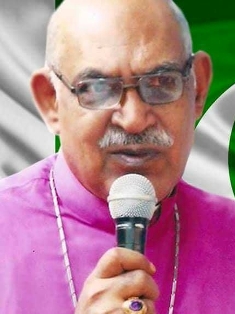 Joining the international chorus of condemnation against Bibi’s continued incarceration, Dr. Injaz Inayat, a former Bishop of the Church of Pakistan, stated: “The Muslims in Pakistan are bringing shame to Islam by abusing the blasphemy laws. The laws are in contravention of the basic principles of the Islamic Jurisprudence.”
Joining the international chorus of condemnation against Bibi’s continued incarceration, Dr. Injaz Inayat, a former Bishop of the Church of Pakistan, stated: “The Muslims in Pakistan are bringing shame to Islam by abusing the blasphemy laws. The laws are in contravention of the basic principles of the Islamic Jurisprudence.”
He called upon the Supreme Court of Pakistan to “fix a date for the hearing of Asia Bibi’s case.” Criticising Pakistani Christian clerical leadership in Pakistan, he questioned: “Why are you not playing the role which is expected of you?”
Directing his criticism to the past and present minority [non-Muslim] Pakistani parliamentarians, he stated, that the minority lawmakers have significantly failed to give any tangible relief to the suffering minorities in Pakistan.
“It is a pity that they [Pakistani minority lawmakers] have not, as yet, formed a pressure group which could take up the incidents of minority rights’ violations with the Pakistani authorities,” said Dr Inayat, who, also runs a media ministry.
Dr. Inayat alleged the Pakistani minority members of parliament of what he called “sin of silence”, alluding to their alleged apathy and complacence when it comes to them taking up the issues of serious Christian and minority rights violation with the Pakistani government.
Dr. Inayat feared the emergence of the “Pakistani Spring,” in the future, if the rising religious intolerance, and the misuse of the Pakistani blasphemy laws did not stop.
“If the current trends in relation to the soaring religious intolerance prevail, I fear that the situation in Pakistan will lead to what we have recently witnessed in Tunisia. Syria and Libya,” said Dr. Ijaz Inayat, alluding to the 2011 unrest and killings in the Middle Eastern counties following what is popularly known as the “Arab Spring.”
He called upon the Pakistani military to control the elements, who, he stated, are killing people in the name of the religion. “Vigilantism and extremism is on the rise. People’s human rights are being violated,” he regretted.
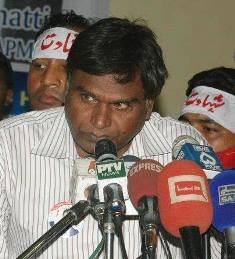 Khalid Gill, Chairman Minority Inqlabi Tehreek Pakistan or MITP (Minority Revolutionary Movement Pakistan), stated that alongside Asia Bibi, they [MITP leaders] have recently demanded the release of all minority people, who, have been put into prisons in Pakistan over alleged blasphemy, as well as the Pakistani Christians, who, he said, are in prison following the 2015 suicide church bombings in the Pakistan city of Lahore.
Khalid Gill, Chairman Minority Inqlabi Tehreek Pakistan or MITP (Minority Revolutionary Movement Pakistan), stated that alongside Asia Bibi, they [MITP leaders] have recently demanded the release of all minority people, who, have been put into prisons in Pakistan over alleged blasphemy, as well as the Pakistani Christians, who, he said, are in prison following the 2015 suicide church bombings in the Pakistan city of Lahore.
Gill criticized the ongoing misuse of the Pakistan blasphemy laws, and cited several incidents of violence in Pakistan, that took place in the past in the majority-Muslim nation, following rumours that the Christians had committed blasphemy.
Gill said his MITP party demands that the Chief Justice of Pakistan, Mian Saqib Nisar, and the army chief, Gen. Qamar Javed Bajwa, to intervene in the Bibi’s case.
He also urged the international community to “speed up its efforts” in relation to the release of Bibi. He called for the immediate and unconditional release of Asia Bibi, stating that “justice delayed, is justice denied.”
Governments around the world should also take a serious note of other human rights violations in Pakistan, remarked Gill.
He appealed to the Pakistani Muslim scholars, of all descriptions, to play their role in promoting tolerance, peace and harmony, in Pakistan. Commenting on the blasphemy-related violence that, in the past, has seen Pakistani churches set to fire, Christian institutions torched and people burned alive, Gill stated: “The killing of one person is a killing of the entire humanity,” he said, referring to a Quranic verse, [Quran 5:32].
On December 28, 2017, Gill stated, that he met the Pakistani Prime Minister, Shahid Khaqan Abbasi, along with Aresh K. Sindh, a former Hindu member of the Pakistan’s national assembly, and stated that during their meeting with the Prime Minister they [Gill and Singh] called for the release of all innocent Christians, who, are currently behind bars. He regretted that people, who, level spurious blasphemy allegations are not given any sentences. They should be prosecuted under the Pakistani law, he demanded.
Highlighting the serious misuse of the Pakistan’s blasphemy laws, he alleged, that several people, in the past, have been killed extrajudicially.
MITP, he added, is committed to advocating the cause of the Pakistani Christians, and other religious minorities, vowing, “MITP will continue to take up the issue of the misuse of the Pakistani blasphemy laws with the Pakistani authorities.”
Sajid Christopher, Executive Director of the Human Friends International, a human rights organisation, in Pakistan, expressed his “profound concern” on the ongoing misuse of the Pakistani blasphemy laws. He stated that his organisation was “very concerned” about the continued imprisonment of Bibi, adding, “Bibi is a mother, who, needs to be reunited with her daughters. Her daughters have grown up now, and they [Bibi and her daughters] have already missed so much time together. Daughters, especially, need their mothers when they are growing up,” said Christopher, adding that one of Bibi’s daughters suffers from a mental illness.
Criticising an excessive delay in the hearing of Asia Bibi’s case in the Supreme Court of Pakistan, Christopher stated that Pakistan’s top court should hear Bibi’s case as soon as possible.
“The Pakistani authorities should look at Asia Bibi’s situation from a humanitarian standpoint,” he said. “She has already been through a lot. Her ordeal must come to an end. No person’s human rights should be breached, whether they live in Pakistan, or in some other country.”
Christopher agreed to the suggestion that the Pakistani blasphemy laws were vaguely formulated, and allowed the registration of a blasphemy case under a wide range of circumstances. He was of the opinion that a high-ranking police official of, at least, the rank of the Superintendent of Police, should investigate blasphemy accusations before registering an FIR. Asked if he would agree that the Pakistani police often rush blasphemy-related investigations due to the pressure from the religious clerics and the mob, he stated, that in most cases, the police do “half-baked investigation, and the victims continue to suffer for years as a result of the registration of the FIR.”
Christopher went on to say that even the judges come under mob’s pressure. “It is, therefore, vitally important that police critically examine the evidence before registering blasphemy-related cases,” he stated.
Pakistani minorities, Christopher remarked, are “patriotic,” adding: “They love Pakistan as much as any other non-Muslim Pakistani do. They [Pakistani minorities] should not be discriminated against. They must be given equal rights.”
 Christopher stated that there has been a surge in the incidents of persecution against Pakistani Christians in recent years, adding, that the incidents of “active persecution” against the Christians of Pakistan soared from 2005-2017. The persecutory incidents, he stated, included attacks on churches, attacks on Christian institutions and properties, forced conversions of Christian, and women from other religious minorities, and their subsequent forcible marriages to Muslim men.
Christopher stated that there has been a surge in the incidents of persecution against Pakistani Christians in recent years, adding, that the incidents of “active persecution” against the Christians of Pakistan soared from 2005-2017. The persecutory incidents, he stated, included attacks on churches, attacks on Christian institutions and properties, forced conversions of Christian, and women from other religious minorities, and their subsequent forcible marriages to Muslim men.
Asked what, in his opinion, was the long-term solution to a myriad of issues facing the Pakistani Christians, and other religious minorities, Christopher stated: “The increasing prejudice against minorities stems from ignorance. Favourable outcomes for minorities can only be achieved by educating people, and by giving awareness and education to every Pakistani citizen about human rights.”
Christopher underlined the need for investing more efforts aimed at promoting inter-faith and inter-religious dialogues in Pakistan, saying, “When people will begin to understand each other’s religion, this should help bring about a reduction in incidents of discrimination and persecution against Pakistani Christians and other religious minorities.”
The international community should play its active role in exerting pressure on the Pakistani authorities, so that the rights of the marginalised sections of the society are not violated, and all people in Pakistan can enjoy religious freedom, said Christopher.
I couldn’t agree more!
Photo captions: 1) Asia Bibi, the courageous Pakistani Christian mother-of-five who is on death row for alleged blasphemy. 2) Salman Taseer with Asia Bibi after her arrest. Many believe that meeting may have cost him his life. 3) John Mason, a member of the Scottish Parliament. 4) Paul Robinson, CEO of Release International (right) with the Archbishop of Canterbury, Justin Welby (center), and Mervyn Thomas, Chief Executive of Christian Solidarity Worldwide (left). 5) Shahid Khan, a Trustee of the Global Minorities Alliance. 6) Dr. Ijaz Inayat, former Bishop of the Church of Pakistan, speaking. 7) Khalid Gill, Chairman of the Minorities Revolutionary Movement Pakistan, speaking at a media event. 8) Asia Bibi with two of her daughters before her arrest. 9) Shahbaz Bhatti, the slain former Federal Minister of Minorities. 10) Sheraz Khan.
About the writer: Sheraz Khan, South Asia Correspondent for the ASSIST News Service, is a Pakistani-British journalist. He lives in Scotland and can be contacted by e-mail: sheraz@btinternet.com
** You may republish this and any of our ANS stories with attribution to the ASSIST News Service (www.assistnews.net). Please also tell your friends and colleagues that they too can have a free subscription to our news service by signing up there.






